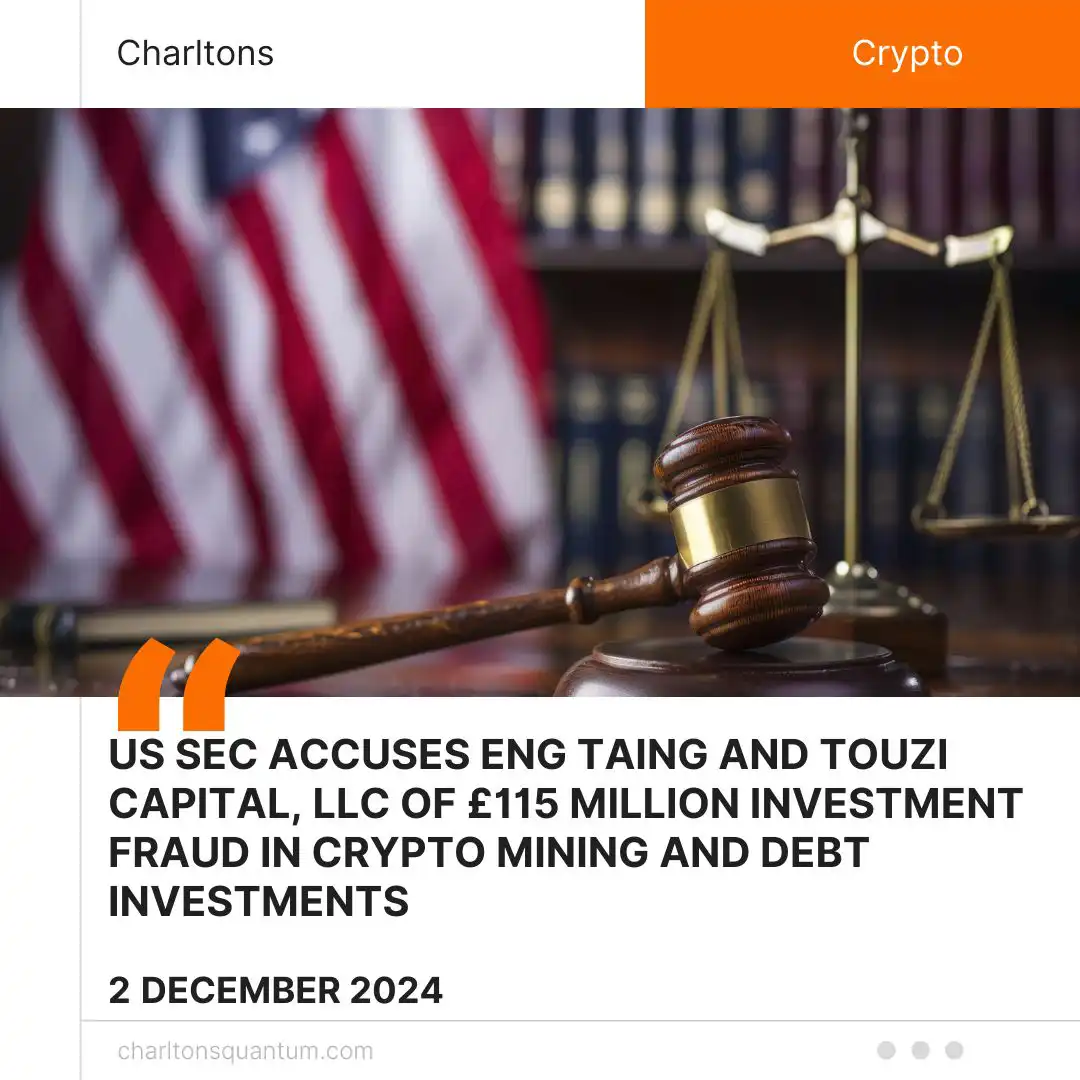
On 29 November 2024, the United States Securities and Exchange Commission (SEC) initiated a civil enforcement action against Eng Taing and his company, Touzi Capital, LLC, for allegedly defrauding investors in connection with cryptocurrency mining and distressed debt rehabilitation schemes. The complaint, filed in the United States District Court for the Southern District of California on 20 November 2024, outlines a number of misrepresentation and financial misconduct. The defendants are accused of raising over £115 million from more than 1,573 investors while misappropriating funds and concealing the high risks associated with the investments.
The United States Securities and Exchange Commission is seeking various remedies, including permanent injunctions to prevent further misconduct, disgorgement of unlawfully obtained gains, civil penalties, and a lifetime prohibition against Eng Taing serving as a director or officer of public companies.
Touzi Capital, LLC, established by Eng Taing in 2020, allegedly solicited funds for what were marketed as innovative and high-return investment opportunities. The company raised approximately £94 million for cryptocurrency mining ventures, promising investors profitability through fixed energy costs and advanced mining equipment. Additionally, it garnered £23 million for distressed debt rehabilitation funds, which were portrayed as stable, liquid investments comparable to high-yield money market accounts.
United States Securities and Exchange Commission alleges that both investment programmes were riddled with misrepresentations. Allegedly, investors were not informed of the speculative and high-risk nature of these ventures. It is alleged that cryptocurrency mining costs were inaccurately calculated, omitting critical factors such as fluctuating energy prices and mining equipment failures. Similarly, the debt rehabilitation schemes relied on third-party entities to fulfil obligations, many of which defaulted or underperformed. Despite these significant challenges, Taing and his firm continued to solicit funds from investors, allegedly offering false assurances about stability and liquidity.
The United States Securities and Exchange Commission accuses the defendants of commingling funds across multiple ventures, violating promises to investors that their money would be used exclusively for the specific purpose of their chosen investment. Instead, funds were redirected to unrelated projects and even personal expenses. It is alleged that Eng Taing personally benefitted by transferring approximately £3.1 million to his private bank accounts and using investor money to cover personal expenditures, including country club memberships and private school fees.
Bank records further reveal that Touzi Capital did not allocate resources appropriately among its cryptocurrency mining funds. Despite raising over £94 million, substantial sums were diverted to other business ventures, leaving many of the intended projects underfunded or inoperable. The United States Securities and Exchange Commission claims that these activities reflect a deliberate strategy of financial manipulation and deceit.
By mid-2022, the financial instability of Touzi Capital’s operations became apparent. In March 2023, a major debtor within the distressed debt rehabilitation programme filed for bankruptcy, rendering many investments worthless. Additionally, issues within the cryptocurrency mining funds compounded losses, as faulty mining equipment and unmanageable energy costs undermined profitability.
Despite these setbacks, Eng Taing allegedly continued to solicit new investments without disclosing the severe challenges facing the business. When Touzi Capital eventually ceased honouring withdrawal requests and stopped communicating with investors in late 2023, it left hundreds of individuals facing substantial financial losses.
The complaint filed by the United States Securities and Exchange Commission alleges violations of multiple provisions under United States federal law. The defendants are accused of contravening Sections 5(a), 5(c), and 17(a) of the United States Securities Act of 1933, which regulate the registration and fraud prevention in securities offerings. They are also charged under Section 10(b) of the United States Securities Exchange Act of 1934 and Rule 10b-5, which prohibit deceptive practices in the sale or offer of securities.
The United States Securities and Exchange Commission is pursuing remedies to address the misconduct including permanent injunctions to prevent future violations, disgorgement of illicit profits along with prejudgment interest, significant civil penalties, and a lifetime prohibition against Eng Taing holding any directorial or executive role in public companies.
(Source: https://www.sec.gov/enforcement-litigation/litigation-releases/lr-26182, https://www.sec.gov/files/litigation/complaints/2024/comp26182.pdf)





